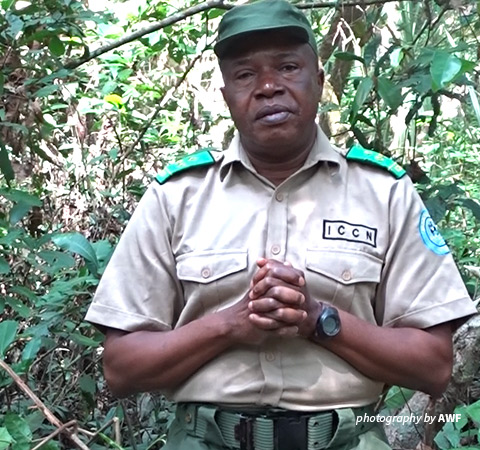World Food Day: Restoring security and relocating markets improves lives in Bili

African Wildlife Foundation and partners boost security patrols in the Bili-Uere landscape
Bili-Mbomu is a protected area complex teeming with wildlife. However, this wonder is being undermined by the unsustainable use of resources. Prospects of artisanal mining activities, agricultural expansion, and increased residential development in this area are serious threats that negatively impact its management.
Consequently, the African Wildlife Foundation (AWF) deemed it imperative to work with local communities to enhance conservation efforts in the region as they are undoubtedly the primary custodians of these ecosystems. The European Union’s ECOFAC6 program, dubbed ‘Ensuring a Sustainable Future for the Bili-Uere Protected Area Complex, its People and its Biodiversity,’ is a partnership with AWF that seeks to promote the community-based approach to sustainable natural resource management.
In partnership with the Institut Congolais pour la Conservation de la Nature (ICCN), AWF has revitalized the Local Committees for Conservation and Development (CLCD) that were created. These structures are frameworks that contribute to biodiversity conservation by strengthening collaboration between the protected area (the Bili-Uere Hunting Domain) and local populations.
These committees allow for concerted design, decision-making, orientation, and planning of actions at the grassroots level; they establish a space for dialogue and serve as a bridge between PA managers and the riparian populations they represent to promote the sustainable management of natural resources and support the sustainable development of communities around the Bili-Uere Hunting Domain (DCBU).
In the fifth year of ECOFAC6 project implementation, AWF conducted a study in February 2022 in seven chiefdoms of the Bili Mbomu Central Zone (BCZM) to measure and understand the level of change that has occurred as a result of the project’s intervention, and to capitalize on the experience gained.
The community admits that before the start of the ECOFAC6 program, survival was difficult. To feed their respective families, they inquired at one or more farmers to find out what food was available in his field, then walked more than 10 kilometers, their hearts uncertain and trembling with fear at the idea of making a potential encounter with rebels on the way. Only adults could do so because the youngest were exposed to kidnapping.
“I am happy to see that efforts made by AWF and its partners to restore security in our area are bearing fruit. Markets are open again and business activities have resumed, making it no longer a problem to get food. Now even my child can go to the market without any worrying about whether he will come back safe and sound or not,” testified Nyamada Léon, head of the Bambilo group.
The hope nourished by the Zandé community is to see that this security situation improves further, not only in the central zone but also over the entire extent of the Bili-Mbomu protected areas complex to allow an effective opening up to make them heard beyond the limits of the province of Bas-Uélé through community development.
“As a leader, I witnessed several scenes of misfortune, in particular the death of young boys in my group who were murdered by the rebels. This is why I hope that this peace that my community enjoys today will also be shared by those who live beyond the central zone of the DCBU,” added Nyamada.
During this study, it was discovered a significant improvement in the living standards of the surveyed households. “The survey highlights 65 percent improvement in food security, an increase in the general level of annual income of the beneficiary communities estimated at US $459, as well as an improved primary school enrollment rate with 98 percent of girls and 96 percent of boys between the ages of 6 and 17,” certified Joel Nkala, AWF monitoring and evaluation consultant, who led the study.
The report mentions an improved perception of security for 65 percent of the communities in the core zone due to the combined efforts of ICCN, AWF, and Maisha group in monitoring with the support of other sister organizations, access to ecosystem services is still essential for 85 percent of the surveyed communities. Partners are satisfied to see that the community can do its business freely, enjoying ecosystem services offered by the landscape without worrying about being apprehended by armed rebels.

DCBU site manager Bernard Iyomi
“Together, we were able to provide eco-guards with training appropriate to the context of the landscape, set up a system for collecting and analyzing security intelligence, and organize aerial surveillance that facilitated the deployment of accurate foot patrols,” said Bernard Iyomi, DCBU site manager.
Under ECOFAC6, the site manager said that the socio-economic sector has been influenced by employment opportunities, the construction of several wells and water sources, the building of a primary school in Gumbu, the construction of the ANIZIBILANI community radio station for the population of Bili-Uere, as well as the retirement and payment of exit allowances to agents eligible for this support.
“In my vision, the next step should be mainly to cover the integrity of the Bili-Mbomu Protected Area Complex by installing new patrol posts, opening up tourism to the Badaye chimpanzees, and expanding community support activities,” he continued.
From restoring security to establishing ongoing collaboration between the community and protected area managers, as well as food security improvement; AWF, ICCN, and all the other implementing partners of the ECOFAC6 program in the Bili-Mbomu Central Zone are seeing a shift in the mindset of the local community.
Once a frustrated community not committed to development because of security instability, today this program has transformed lives. The Zandé people are now thinking about investing in their community and looking to the future in a whole new way.
At the end of this survey, it was observed that communities were enthusiastic about the work of the protected area and AWF’s contribution, bringing this lost corner of the Democratic Republic of Congo to life again through community involvement initiatives.
> Learn how AWF supports sustainable agriculture in the Bili landscape